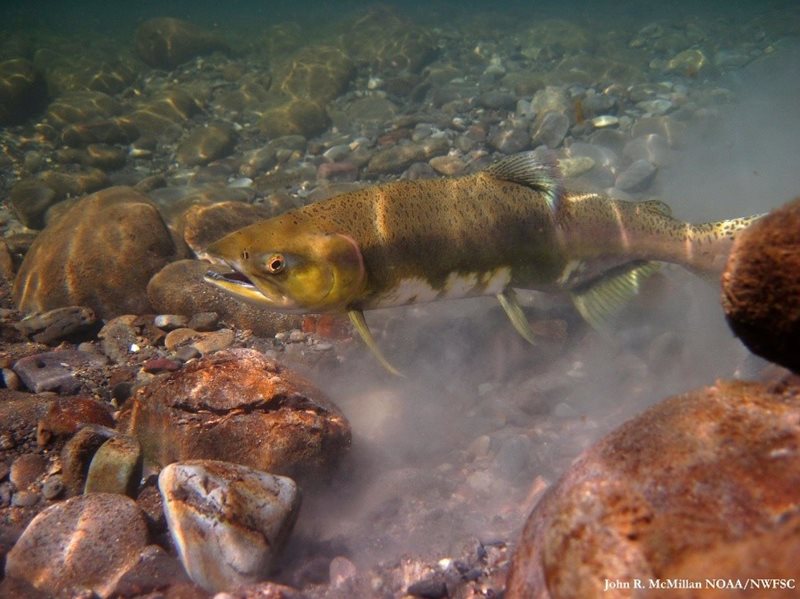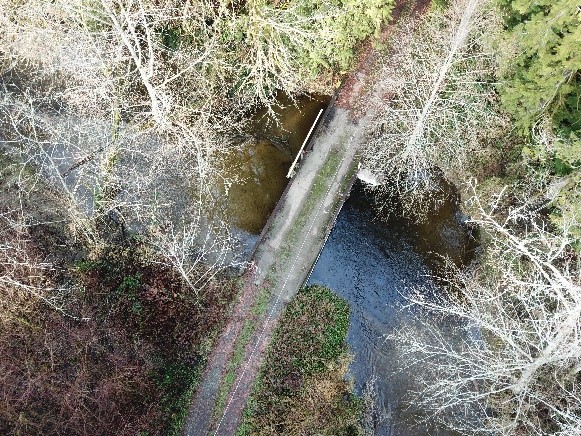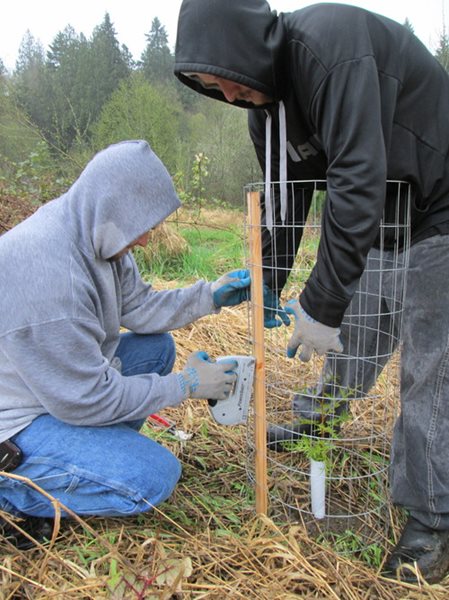The Squaxin Island Tribe will use a $20,000 Husseman grant to remove this deteriorating bridge over Cranberry Creek in Mason County currently blocking fish passage.
Follow us on Facebook for activities to celebrate Earth Day at home.
Every day is Earth Day at Ecology. We work in partnership with local and tribal governments, other state and federal agencies, non-profit conservation and fisheries enhancement groups, businesses, and residents to protect and restore Washington’s land, air, and water.
As the state’s environmental protection agency, we spend a great deal of energy protecting, improving, and restoring the water quality of streams, rivers, lakes, and marine waters.
Every year, we set aside some of the payments we get from the penalties we issue for violations of the state Water Pollution Control Act into our special Terry Husseman Account. Named after a long-time Ecology deputy director who died in 1998, the money in the Husseman account honors contributions in the field of environmental management.
Projects to improve local water quality
This year, we are awarding nearly $257,000 in Husseman grants to local and tribal governments and non-profit environmental groups across the state. We have selected seven different projects in Chelan, Clark, Mason, Okanogan, Skamania, Snohomish, and Spokane counties designed to improve water quality, enhance aquatic habitat, and restore shorelines.
The most any single project could be awarded is $50,000 in grant funding to benefit state residents.
From removing fish passage barriers to environmental education
Starting June 1, 2020, the investments will pay for a variety of projects, from installing fencing to keep animals out of critical streams, identifying and removing salmon passage barriers, returning floodplains to natural conditions, improving fish spawning and rearing habitat, removing invasive plant species and planting native vegetation, and providing community environmental education opportunities.
We evaluated 21 different project submittals worth about $700,000. We weighed each proposal’s expected environmental benefits, local support and involvement, cost effectiveness, and readiness of each project to proceed and be completed on time and on budget.
2020 Terry Husseman Grant awards
In Chelan County, we awarded a $27,710 grant to the Cascade Columbia Fisheries Enhancement Group for the Lower Sleepy Hollow Riparian Enhancement and Education Project. The fisheries group uses the award to work with the Yakama Tribe and other local experts to restore fish and wildlife habitat and improve water quality at the 40-acre Lower Sleepy Hollow property in the Wenatchee River floodplain. They remove metal debris, stabilize the river shoreline, and plant riparian vegetation. The grant supports a larger local effort to offer community education about floodplain restoration and functions.
In Clark County, a $49,035 grant will fund the Rock Creek Riparian Habitat Enhancement Project. The Clark Public Utility District will use the award to remove invasive plant species in the Salmon Creek watershed and replant native riparian species to increase shading in the salmon-bearing creek while boosting stream flows, filtering sediments, and controlling erosion. The restoration activities will boost water quality, increase native plant and animal diversity, and create public education opportunities.
Aerial overview of failing log bridge over Cranberry Creek.
In Mason County, the Squaxin Island Tribe used a $20,000 grant to sucessfully remove the Cranberry Creek Bridge at Oakland Bay near Shelton. The tribe used the award to remove the failing 55-foot log bridge over Cranberry Creek. They have also decommissioned the access road on either side, and will remove riprap, replant native vegetation, and install a new access road that avoids crossing Cranberry Creek. Removal of the bridge will allow juvenile Coho salmon and other fish to finally move unimpeded from Oakland Bay to Lake Limerick, Cranberry Lake, and associated wetlands.
In Okanogan County, we provided a $30,043 grant to the Cascade Columbia Fisheries Enhancement Group for the Mazama Park Riparian Habitat Enhancement Project. The group will use the award to enhance six acres of habitat along the upper Methow River. Once complete, the Mazama Park project will provide public access, educational information, and highlight restoration activities in a river reach important for Chinook salmon, steelhead, and bull trout.
In Skamania County, the Underwood Conservation District was awarded $38,959 to help fund the Washougal River Habitat Assessment Project. The district will develop a database of potential water quality and habitat enhancement projects in priority reaches. This includes identifying fish passage and irrigation improvement projects, and evaluating where woody debris can be placed, side channels created, native vegetation planted, and water quality improved for salmon and important species.
Photo coutesy Snohomish Conservation District
In Snohomish County, our partners at Snohomish Conservation District received a $44,967 grant for the Woods Creek Riparian Forest Maintenance Project. The district will use the award to maintain a 32-acre riparian forest buffer to improve dissolved oxygen levels, water temperatures, and water quality at a core salmon spawning reach in Woods Creek. The district will also remove invasive plant species to protect the health of young trees planted along the creek.
In Spokane County, we awarded the Spokane Conservation District $36,529 to invest in the Hangman Creek Water Quality Protection Project designed to improve water quality in 15 acres of the Hangman Creek watershed after decades of livestock access. Actions include planting riparian vegetation, installing 3,200 feet of livestock exclusionary fencing, and relocating two off-creek water facilities. This project will improve riparian habitat, protect stream banks, and reduce erosion in the creek.






